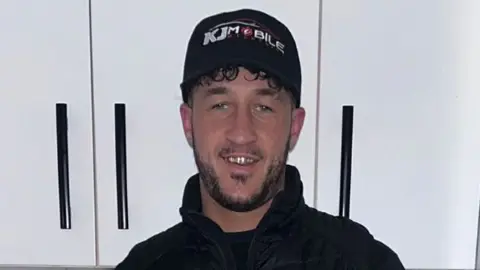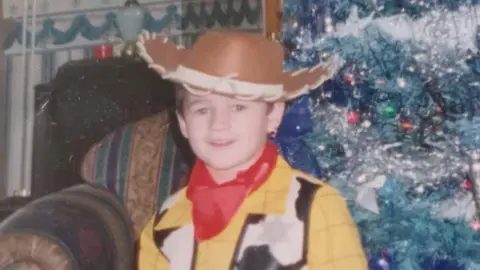PC said force used during crisis was proportionate
 Family handout
Family handoutAn officer involved in the detainment and restraint of a 26-year-old man during a mental health crisis has told an inquest the force used was "proportionate".
Kaine Fletcher died at Queen's Medical Centre in Nottingham on the morning of 3 July 2022, hours after he was detained under the Mental Health Act.
Nottingham Coroner's Court heard how the father of two, who had not been accused of a crime, was placed in handcuffs, leg restraints and a spit guard, and restrained on a pavement during the incident.
PC Hannah Bodle, who used emergency powers to detain him, told the inquest "every decision that was made at that time was made in the best interests" of Mr Fletcher.
The jury inquest began on 30 June and has heard Mr Fletcher had been diagnosed with paranoid personality disorder in 2020.
Mr Fletcher, who the inquest has heard was under the influence of cocaine at the time of the incident, had also struggled with a drug addiction for several years.

Nottinghamshire Police officers attended the young people's charity YMCA, where Mr Fletcher was staying on 3 July, after a family member called 999 over concerns he might be at risk of suicide.
The court heard there was an eight-hour wait for an ambulance that night, so police were asked to attend to carry out a welfare check.
In her evidence, PC Bodle said the 26-year-old's room was "in disarray" and described him as "erratic, difficult to understand" and said he "appeared distressed".
After initially agreeing to go with the two officers to hospital for a mental assessment, he left the accommodation and got into their police car.
However, moments later, Mr Fletcher no longer believed the pair were police officers and became more distressed, the court heard.
Her colleague's body-worn camera footage showed PC Bodle used her warrant card to prove her identity, but 23 seconds later, while Mr Fletcher was still unconvinced, she detained him under Section 136 of the Mental Health Act.
Section 136 gives police emergency powers that allow them to remove a person to a place of safety if they believe it is necessary.
Mr Fletcher resisted being detained, and the inquest heard how a number of other officers attended shortly after.
 Family handout
Family handoutMr Fletcher was restrained in the police car for 10 minutes with handcuffs and leg restraints.
After hitting his head on the inside of the police car, he was removed and further restrained on the pavement, the court heard.
Mr Fletcher was eventually lifted into a police van by officers but began hitting his head against the inside of the van.
It was then decided he could not be transported to hospital "in that manner".
The court heard Mr Fletcher said he was struggling to breathe on two occasions and at one point asked to be taken to hospital.
PC Bodle told the inquest Mr Fletcher's physical condition was monitored "throughout" the period of restraint.
When asked by coroner Alexandra Pountey whether she would agree the involvement of more officers was likely to "escalate the situation", PC Bodle said "you could argue that".
PC Bodle said she believed trying to "contain" Mr Fletcher, who she said was "clearly in a mental health crisis", was the right thing to do to ensure he did not abscond and potentially bring harm to himself.
"The force that was used was proportionate, I believe," she said.
The court heard PC Bodle did not put on her body-worn camera until after the incident had escalated.
At one point during his detainment outside the accommodation, the court heard PC Bodle "struck him on the legs" which she did not include in her initial "use of force report", a form used to document physical force used by police against an individual.
She told the court: "It was done after a very tiresome, emotional incident - if it wasn't on there it wasn't done deliberately."
The inquest continues.
If you've been affected by the issues in this story, help and support is available via the BBC Action Line.
Follow BBC Nottingham on Facebook, on X, or on Instagram. Send your story ideas to [email protected] or via WhatsApp on 0808 100 2210.
